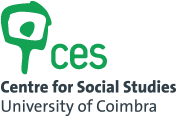XVII Young Social Scientists
Research Paths and Narratives in Social Sciences
October 11, 2022, 14h30
Room 1, CES | Alta
Programme
Performance, historicity and geographies of expressivity: constructing an object from music | Leonor Losa (Centre for Interdisciplinary Studies on the 20th Century, University of Coimbra)
Bio note: Leonor Losa was born in Braga in 1981. Researcher in the field of ethnomusicology, her work deals in particular with change in the field of popular music and its articulations with social, political, economic and institutional dimensions. She has developed reflection on the policies, aesthetics and discourses of the recording industry in Portugal, a field of music studies that she contributes to configure. She has investigated the dynamics of the implementation of the record market in Portugal in the early twentieth century and the social mobility of recorded music, whose results are presented in the book 'Machinas Fallantes': A música gravada em Portugal no início do século XX. Her doctoral thesis, “Ser fadista é maior que ser cantor”: Intersubjectividade, voz e o ethos da memória” is an ethnomusicological ethnography around the Fadista Ricardo Ribeiro, configuring itself as a proposal of biographical ethnography.
Action-research in the area of food and agricultural systems: how to put academia at the service of food sovereignty | Lanka Horstink (Institute of Social Sciences, University of Lisbon)
Bio note: I have extensive experience in the area of group dynamics and informal adult education, initially in Social Psychology and Project Management. After a career in communication, I worked as a campaign coordinator (Greenpeace Oceans Campaign and Campaign for Free Seeds), adult educator and community activist. For my work in defence of traditional seeds, I received the 1st Terre de Femmes prize in 2014. After completing my PhD in Sociology with a dissertation on the ecological-democratic quality of the political economy of the food system, I worked, representing FEUP-UPorto, as researcher and task leader (WP2) of the H2020 project "PROSEU", carrying out a review of the state of the art and a survey at European level on collective forms of self-consumption of renewable energy. At ICS-ULisboa my post-doctoral research aims to assess the ecological-democratic quality and the respective participatory evaluation criteria for the successful development in Portugal of strongly sustainable small-scale agro-food initiatives.
'Investigate at the margins'. Architecture in the 20th century agricultural colonies in Portugal | Filipa Guerreiro (Faculty of Architecture, University of Porto)
Bio note: Filipa Guerreiro was born in Viana do Castelo in 1976. She received her PhD in 2016 with the thesis ''Colónias Agrícolas Portuguesas Construídas pela Junta de Colonização Interna entre 1936 e 1960. A Casa, o Assentamento e o Território' (published by Dafne Editora in 2022 under the title Colónias Agrícolas). In 2009 he took the FAUP's Pedagogical Aptitude and Scientific Capacity Tests under the title 'Territory, Palimpsest, Premise'. He took a post-graduate course in 2005 in Intervention Methodologies in Architectural Heritage and graduated in Architecture from FAUP in 2000. Currently teaches Project I in the Integrated Masters in Architecture and Optional 6 'Affinities between Research and Project - Representation as matter, process and communication' in the PhD programme in Architecture. Researcher at the Centre for Studies in Architecture and Urbanism of FAUP.
Moderator: Inês Nascimento Rodrigues (Centre for Social Studies of the University of Coimbra)

